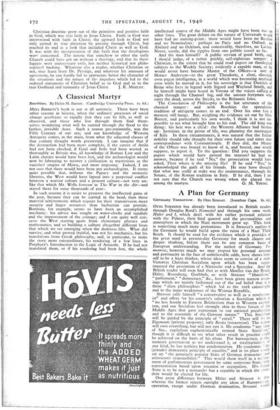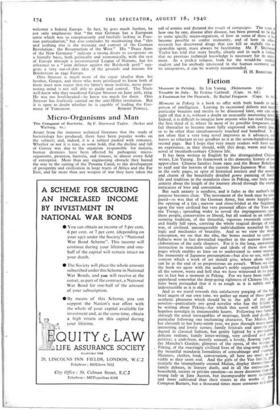A Plan for Germany
Germany Tomorrow. By Otto Strasser. (Jonathan Cape. 8s. 6d.)
Orro STRASSER has already been introduced to British readers through Douglas Reed's Nemesis? and through his own work, Hitler and I, which dealt with his earlier personal relations with the Fiihrer, their final quarrel and the personalities and atmosphere in which the Nazi movement grew up. This book is something much more pretentious. It is Strasser's outline of the Germany he would build upon the ruins of a Nazi Third Reich. It should be read for the evidence which it provides of the great need in present-day Germany for much clearer and deeper thinking, before there can be any common basis of European understanding. For the author of Germany To- morrow, however much we may respect his personal courage and pertinacity in the face of unbelievable odds, here shows him- self to be a hazy thinker, whose ideas seem to consist of a mid- Victorian Christian Socialism upon which has been super- imposed the pessimism of a Nietzsche and a Spengler. And the British reader will soon find that as with Moeller van der Bruck, Hitler, Rosenberg, Goebbels, so with Strasser " liberalism," " parliament," " democracy," &c., have been given narrow mean- ings which are mainly fashioned out of the sad belief that it is these " alien philosophies " which led to the 1918 catastrophe and to the inner weaknesses of the Weimar Republic. Strasser calls himself " a conservative as well as a revolution- ist" and offers for his country's salvation a Socialism which is " no less hostile to Eastern Bolshevism than to Western capital- ism, and our Socialists feel strongly akin to those forces of the Middle Ages that gave expression to our national peculiarities and to the essentials of the German nature." This Socialism will be guided by the principle of " entail." There will h no Eigentum (private property), only Besitz (possession). The na=tion will own everything, but will not run it. He condemns " any form of Stu.. capitalism euphemistically termed State Socialksn," though it is difficult to see what other result in practice could aristocratic responsibility." This would show itself in a replace' achieved on the basis of his- plans. For bureaucracy, P mentary government as we understand it, or totalitarianism d any kind, he has nothing but condemnation. He condemns " the (pseudo) democratic principle of equality," and in its place Youth , set up "the genuinely popular State of German democracy and ment of parliamentary government by some corporate State, with representation based upon vocation or occupation. His flaw'. State is to be not a monarchy but a republic in which the pre9" dent would be elected for life.
One great difference between Hitler and Strasser its that whereas the former rejects outright any ideas of European c°, operation, except under German domination, Strasser would
welcome a federal Europe. In fact, he goes much further, he not only emphasises that " the true German has a European sense which was so conspicuously and fatefully lacking in Prus- sian particularism," but also concludes by maintaining that " this and nothing else is the meaning and content of the German Revolution: the Resurrection of the West." His " Peace Aims of the New Germany " indicate a strong desire to co-operate on a friendly basis, both politically and economically, with the rest of Europe through a reconstructed League of Nations, but his reference to a " joint defence against the Bolshevik peril " sug- gests a very out-of-date idea of the grounds and reasons for Bolshevism in 1940 Europe. Otto Strasser is much more of the vague idealist than his brother, Gregor, and those who were privileged to know both of them must now regret that the latter's more realistic, more pene- trating mind is not still able to guide and control. The Nazis well knew why they murdered Gregor Strasser on June 30th, 1934. He was too level-headed—he knew too much for them. Otto Strasser has fearlessly carried on the anti-Hitler revolution. But it is open to doubt whether he is capable of leading the Ger-



























 Previous page
Previous page